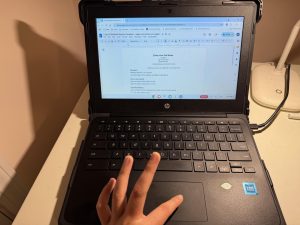Suicide jokes are killing our students.
December 16, 2016
“I’m gonna kill myself.”
“I want to die.”
“Oh, are you triggered now?”
These words have become so common in the language of students that hearing them in the hallways is as ordinary as hearing someone asking about that night’s math homework. Even if not spoken aloud, many people might text KMS (kill myself) in the midst of a stressful studying session.
While many people who use these phrases do not mean them literally, some who say such phrases might actually be suffering from mental illness or suicidal thoughts. When we joke about this issue, we only perpetuate the stigma surrounding mental illness. And this is why I believe that the suicide jokes need to stop.
According to the National Alliance on Mental Health, 1 in 5 teenagers have or will have a severe mental illness. This includes mood disorders, anxiety disorders, substance use disorders, and eating disorders. Because of the shame surrounding mental health issues, it is difficult for those who are suffering to reach out and seek treatment. Particularly, those with depression will often isolate themselves even more, aggravating the condition. Suicide jokes cause a growing barrier between the reality of mental illness and our perception of mental illness.
Many other students are not happy with misuses of phrases like “I’m going to kill myself”.
Senior Jack Crossley expressed his offense, “People who do take [suicide] as a joke are quite selfish because there are people that actually do commit suicide.”
As for the word “trigger”, most people who use it have no idea about its real meaning. Psychologically, trigger is defined as any stimulus, including sounds, smells, or sights, that causes feelings of trauma to a person who has suffered any sort of mental illness. However, students now use the word to mock anyone for being too sensitive, frustrated, or even mildly annoyed.
As one student described, “For the majority of us, [triggered] is like a meme.”
Having suffered from anorexia, depression, and anxiety, I myself have certain triggers. For example, reading about any eating disorders gives me flashbacks to when I lay in a hospital bed and was being force fed. Speaking or presenting in front of people can give me a panic attack. Even the word “anorexia” brings me feelings of discomfort and memories of that terrible period in my life.
But “trigger” now has a negative connotation and only serves to mock emotional distress.
Sophomore Rhea Sen recalled, “There wasn’t much going through my mind, it kind of just came out of my mouth […] Now, after I became aware of that stuff, I stopped using it.”
Some people who have actually had mental health issues don’t think that suicide-related jokes are as detrimental. Conversely, they think it acts as a “coping mechanism” and helps to make light of a heavier situation.
One student explained, “I have attempted suicide in the past, which is why I think that I still joke about it, ‘cause I think that it’s like, ‘oh, well it’s fine now’.”
But this only shows how a lot people who joke about such heavy issues are actually silent sufferers. They may be tempted to mask their current suffering or hide their past conditions by joking along. Then it becomes even harder to tell if someone who says they want to kill themselves is just joking, or actually suicidal.
Eradicating these phrases from our speech completely would be almost impossible, since hyperbolic expressions are like the butter to our bread. However, it is worth stopping and thinking about the meaning behind the words you are about to say. “Is this really how I feel?” Acknowledge the silent sufferers, and how these words impact them.
It’s time we stop this stigma surrounding mental health. It’s time we banish the fear that our emotions will be slandered and scoffed at. It’s time we end the suicide jokes.






